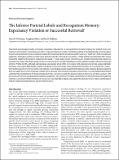The inferior parietal lobule and recognition memory : expectancy violation or successful retrieval?
Abstract
Functional neuroimaging studies of episodic recognition demonstrate an increased lateral parietal response for studied versus new materials, often termed a retrieval success effect. Using a novel memory analog of attentional cueing, we manipulated the correspondence between anticipated and actual recognition evidence by presenting valid or invalid anticipatory cues (e. g., "likely old") before recognition judgments. Although a superior parietal region demonstrated the retrieval success pattern, a larger inferior parietal lobule (IPL) region tracked the validity of the memory cueing (invalid cueing > valid cueing) and no retrieval success-sensitive lateral parietal region was insensitive to cueing. The invalid cueing response occurred even for correctly identified new items unlikely to trigger substantive episodic retrieval. Within the IPL, although supramarginal and angular gyrus (SMG; AG) regions both demonstrated invalid cueing amplitude elevations, each region differentially coupled with distinct cortical networks when unexpectedly old items were encountered; a connectivity pattern also observed at rest in the same subjects. These findings jointly suggest that the lateral parietal response during recognition does not signify the recovery of episodic content, but is a marker of the violation of memory expectations. A second independent dataset confirmed this interpretation by demonstrating that SMG activation tracked the decision biases of observers, not their accuracy, with increased activation for nondominant recognition judgments. The expectancy violation interpretation of the lateral parietal recognition response is consistent with the literature on visual search and oddball paradigms and suggests that damage to these regions should impair memory-linked orienting behavior and not retrieval per se.
Citation
O'Connor , A R , Han , S & Dobbins , I G 2010 , ' The inferior parietal lobule and recognition memory : expectancy violation or successful retrieval? ' , The Journal of Neuroscience , vol. 30 , no. 8 , pp. 2924-2934 . https://doi.org/10.1523/JNEUROSCI.4225-09.2010
Publication
The Journal of Neuroscience
Status
Peer reviewed
ISSN
0270-6474Type
Journal article
Collections
Items in the St Andrews Research Repository are protected by copyright, with all rights reserved, unless otherwise indicated.

